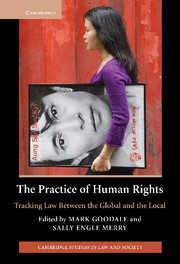Book contents
- Frontmatter
- Contents
- Contributors
- Acknowledgments
- Introduction Locating rights, envisioning law between the global and the local
- PART ONE STATES OF VIOLENCE
- PART TWO REGISTERS OF POWER
- PART THREE CONDITIONS OF VULNERABILITY
- PART FOUR ENCOUNTERING AMBIVALENCE
- Conclusion Tyrannosaurus lex: the anthropology of human rights and transnational law
- Index
- References
Conclusion Tyrannosaurus lex: the anthropology of human rights and transnational law
Published online by Cambridge University Press: 29 March 2011
- Frontmatter
- Contents
- Contributors
- Acknowledgments
- Introduction Locating rights, envisioning law between the global and the local
- PART ONE STATES OF VIOLENCE
- PART TWO REGISTERS OF POWER
- PART THREE CONDITIONS OF VULNERABILITY
- PART FOUR ENCOUNTERING AMBIVALENCE
- Conclusion Tyrannosaurus lex: the anthropology of human rights and transnational law
- Index
- References
Summary
INTRODUCTION
This chapter seeks to complement the emphasis in this volume on the discursive and social aspects of human rights by focusing on their legal character, and how this shapes the responses of local actors who generate innovative discursive and political strategies within a rights paradigm. Law is not the only viable setting for an ethnography of human rights, nevertheless anthropologists need to have better analytical tools for understanding the institutional environment in which rights are generated and enforced. Law is the focal point of studies of human rights in international relations, political science and international law, and anthropologists cannot afford to neglect the legal aspects of human rights, if their insights are going to have a salience beyond the discipline.
The question then becomes, what conceptual ideas can the field of legal anthropology offer to the study of human rights in transnational and domestic law? While the origins of legal anthropology can be traced back to Maine, Morgan, and Marx, the history of the anthropology of human rights in transnational legal processes is relatively recent. Less than twenty years old, the anthropology of transnational law came into its own in the 1990s during an epoch of the rapid globalization of law and the rise of a more robust international human rights legal framework. Anthropologists responded to this resurgence of global humanitarianism by studying a number of its manifestations, from refugee camps to HIV/AIDS clinics to local courts.
- Type
- Chapter
- Information
- The Practice of Human RightsTracking Law between the Global and the Local, pp. 342 - 369Publisher: Cambridge University PressPrint publication year: 2007
References
- 36
- Cited by

